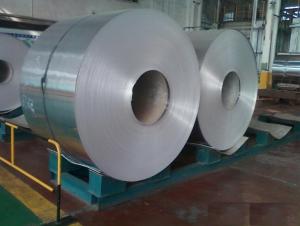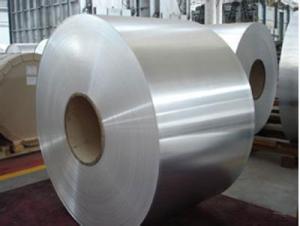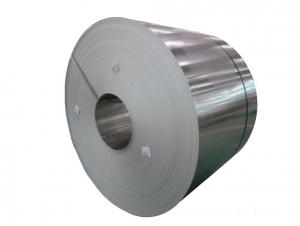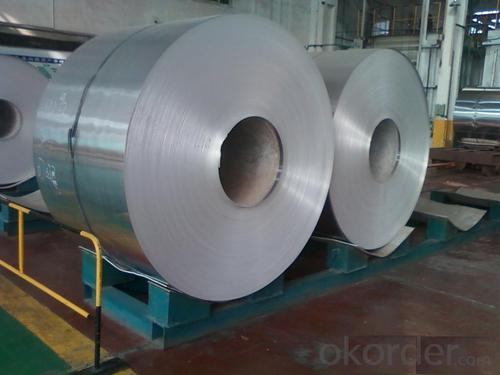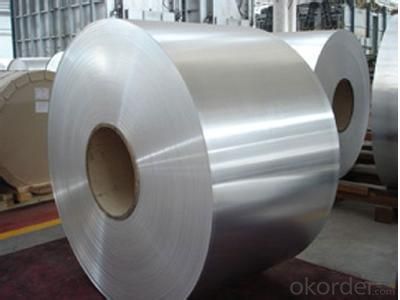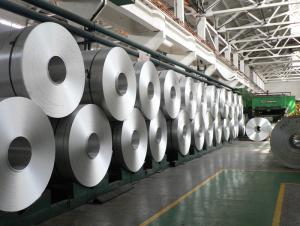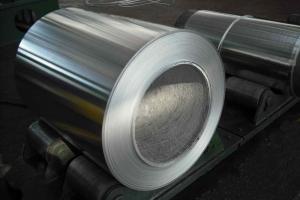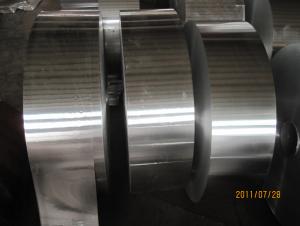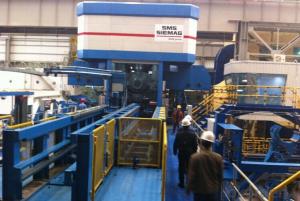Aluminum Strip Coil - Direct Continuous Aluminium Foil Stock in Coil AA1235
- Loading Port:
- China Main Port
- Payment Terms:
- TT or LC
- Min Order Qty:
- -
- Supply Capability:
- -
OKorder Service Pledge
OKorder Financial Service
You Might Also Like
1.Structure of Product Description
Direct Continuous Aluminium Foil Stock in Coil is one semi-finished aluminium material. This strip can be rolled down to aluminium foil.The final thickess can be 5-20 microns. Aluminium foil is soft, ductile and with a silver-white luster which can be widely used in a large scare of fields.
2. Main features of the product
a.Competitive price---We have our own mills and can produce mill finished aluminium coils, so we can control the production cost better.
b.Professional after-sale service---We have more than 15 years exportation experience and you need not worry about the exporation problems.
c.Fast delivery time---We can control the delivery time within 35 days.
3. Image
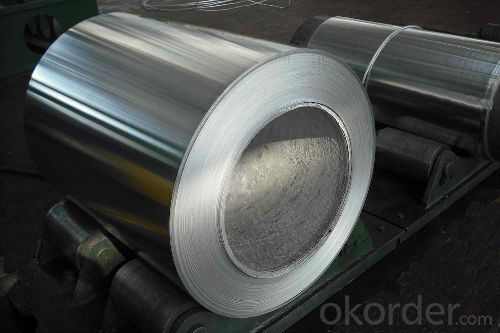
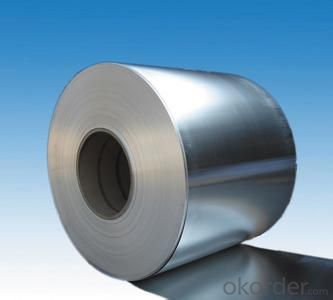
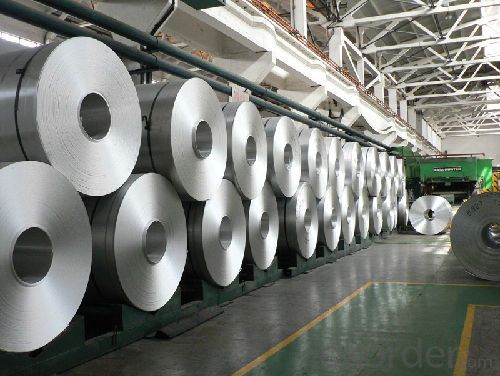
4.Products Specification
| Alloy | Temper | Thickness | Width | Coating |
| AA1235 | H14,H16 | 0.3MM-0.5MM | 200-1900MM | HSL/Primer |
5.FAQ
What is the quality standard?
---Usually our standard is GB3880-2006
What is the largest width?
---It is 2300mm
What is the MOQ?
---Usually we can accept 80 tons.
- Q: Are aluminum coils suitable for pharmaceutical packaging?
- Pharmaceutical packaging finds aluminum coils to be a fitting option. The pharmaceutical industry extensively utilizes aluminum due to its remarkable qualities of offering a barrier, durability, and flexibility. It effectively safeguards against moisture, light, oxygen, and other external elements that may compromise the quality and stability of pharmaceutical products. Aluminum coils allow for effortless molding into diverse shapes and sizes, making them ideal for packaging various pharmaceutical products like tablets, capsules, and ampoules. The packaging can be tailored to specific requirements, ensuring proper sealing and protection during storage and transportation. Moreover, aluminum is both non-toxic and chemically inert, guaranteeing that it does not react with the contents of the package. This is crucial for maintaining the medication's integrity and safety. Additionally, aluminum coils possess excellent heat conductivity, rendering them suitable for the commonly employed heat-sealing processes in pharmaceutical packaging. Apart from their functional properties, aluminum coils offer a sustainable and environmentally friendly choice for pharmaceutical packaging. They are easily recyclable, reducing the environmental impact and promoting sustainability within the healthcare industry. In summary, the barrier properties, flexibility, customization options, non-reactivity, heat conductivity, and sustainability of aluminum coils make them highly appropriate for pharmaceutical packaging.
- Q: I have a muffin pan made of aluminum foil and I do not know if i can put it in the oven to cook some muffins. Many sights say it will melt but they say that about putting a sheet of foil at the bottom of the oven for a long time. I just want it to be in their for half an hour to make muffins.
- Aluminum melts at 1220 degrees F (or around 660 degrees C) [from Wikipedia]. If you are cooking anything at that temperature, you are crazy and have a monster oven. So yeah, no problem with that.
- Q: How are aluminum coils used in the production of consumer electronics?
- Aluminum coils are commonly used in the production of consumer electronics for various purposes such as heat dissipation, electrical conductivity, and structural support. They are often found in devices like laptops, smartphones, and televisions, where they help in maintaining the temperature of internal components, ensuring efficient performance. Additionally, aluminum coils are used in circuit boards and connectors to facilitate the flow of electricity and enhance conductivity. Their lightweight nature and corrosion resistance make them ideal for consumer electronic applications.
- Q: In my line of work I see aluminum ground lugs, bonding nuts and straps and also neutral bars eat copper up, especially when exposed to the elements. I know how galvanic reaction works between elements under current load, but my question is why do aluminum and copper seem to hate each other more than any other? And, why would they still be required in usage together per NEC code?
- that's a single alternative reaction. The aluminum and the copper swap places, yielding copper and aluminum sulfate. Please notice: the 1st answer describes a chemical equation with nitrate, no longer sulfate. otherwise, this is the perfect format.
- Q: Are aluminum coils suitable for use in heating applications?
- <p>Yes, aluminum coils can be used for heating. They are known for their excellent thermal conductivity, which allows for efficient heat transfer. Aluminum's lightweight nature and resistance to corrosion make it a popular choice in various heating applications, such as in electric heating elements, heat exchangers, and cookware. However, it's important to note that aluminum's low melting point means it's not suitable for high-temperature applications and should be used within safe temperature limits to prevent melting or damage.</p>
- Q: What is the corrosion resistance of aluminum coils?
- Aluminum coils exhibit excellent corrosion resistance due to the formation of a protective oxide layer on its surface. This oxide layer acts as a barrier, preventing further corrosion and providing long-term durability. The corrosion resistance of aluminum coils is further enhanced through various surface treatments and coatings, such as anodizing or painting, which provide an additional layer of protection. This makes aluminum coils a reliable choice for a wide range of applications in industries such as construction, automotive, and aerospace, where resistance to corrosion is essential.
- Q: metals an aluminum can is made of, cast aluminum, 6160 aluminum, sheet aluminum
- the aluminum is alloyed with various metals to change the characteristics of the aluminum the link below shows a table showing the various chemical/metals added to aluminum to make different alloys
- Q: Aluminum roll, which companies are used?
- Too many things that you can see every day, with all the things that are made of aluminum, and the companies that make these aluminum products are useful, so it's unclear!
- Q: Describe the process of rolling aluminum coil in a few sentences.
- <p>The process of rolling aluminum coil involves several key steps. Initially, aluminum ingots are heated to a specific temperature to make them pliable. Then, they are passed through a series of rolling mills where the ingots are pressed and shaped into thin sheets or coils. This process reduces the thickness and increases the length and width of the material. During rolling, the aluminum may be annealed to improve its ductility and strength. After rolling, the aluminum coil is cooled, cleaned, and inspected for quality. The final step includes coiling the rolled aluminum into manageable rolls for storage and transportation. This process is critical for producing aluminum coils used in various industries such as construction, automotive, and packaging.</p>
- Q: This question asks for the distinctions between aluminum coil and steel coil, focusing on their properties and uses.
- <p>Aluminum coil and steel coil differ in several aspects. Aluminum coil is lightweight, corrosion-resistant, and has good thermal conductivity, making it ideal for applications requiring flexibility and resistance to weathering. It's commonly used in construction, packaging, and electrical applications. Steel coil, on the other hand, is stronger and more durable, suitable for heavy-duty applications. It's often used in automotive, construction, and manufacturing due to its high strength and ability to withstand heavy loads. Steel is also magnetic, which is a property not shared by aluminum. The choice between aluminum and steel coil depends on the specific requirements of the project, such as weight, strength, and environmental resistance.</p>
Send your message to us
Aluminum Strip Coil - Direct Continuous Aluminium Foil Stock in Coil AA1235
- Loading Port:
- China Main Port
- Payment Terms:
- TT or LC
- Min Order Qty:
- -
- Supply Capability:
- -
OKorder Service Pledge
OKorder Financial Service
Similar products
Hot products
Hot Searches
Related keywords
